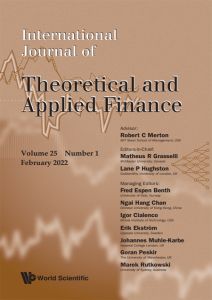

Optimal Climate Policy with Negative Emissions
International Journal of Theoretical and Applied Finance, Special Issue on the Impacts of Climate Change on Economics, Finance, and Insurance, Volume 27, Issue 01, ...
Author(s):
Summary:
International Journal of Theoretical and Applied Finance, Special Issue on the Impacts of Climate Change on Economics, Finance, and Insurance, Volume 27, Issue 01, February 2024
Using a modification of the DICE model, the authors analyse the optimal use of emissions abatement and removal as policy responses to climate change. After calibrating the marginal costs of abatement and CO2 removal to the latest scientific information, they find that carbon removal must play a very important role in an optimal policy. If this policy is followed, they find that the Paris-Agreement 1.5-2 C warming by 2100 target is not just aspirational, but optimal.
Key Takeaways:
✔️ Net-Negative Emissions: The research emphasizes that an optimal policy should aim for net-negative, not just net-zero emissions, highlighting the vital role of active CO2 removal.
✔️ Economic Implications: Achieving these targets will require significant economic and sectoral shifts, with the carbon removal industry needing to expand dramatically.
✔️ Policy Considerations: The study also cautions against the risk of moral hazard, where slowing abatement efforts might not be offset by sufficient carbon removal, advocating for maintaining current emission targets while scaling up carbon removal initiatives.
The paper is free-to-read at this link.
Keywords: Climate change, global warming, negative emissions technologies, integrated assessment models
| Type : | Academic Publication |
|---|---|
| Date : | 27/08/2024 |
| Editor : | World Scientific |

